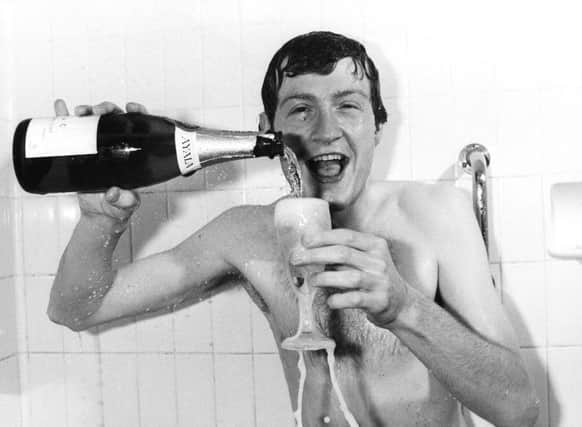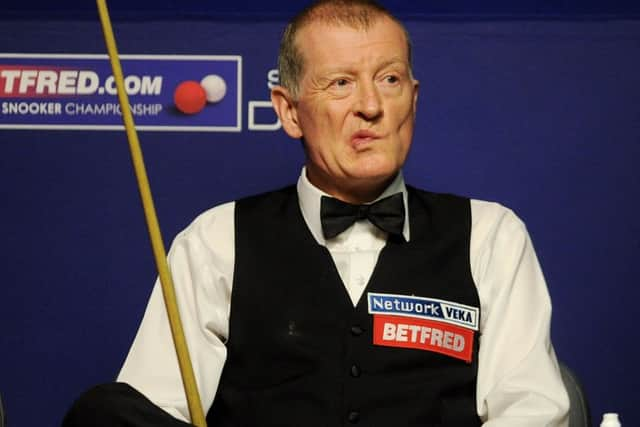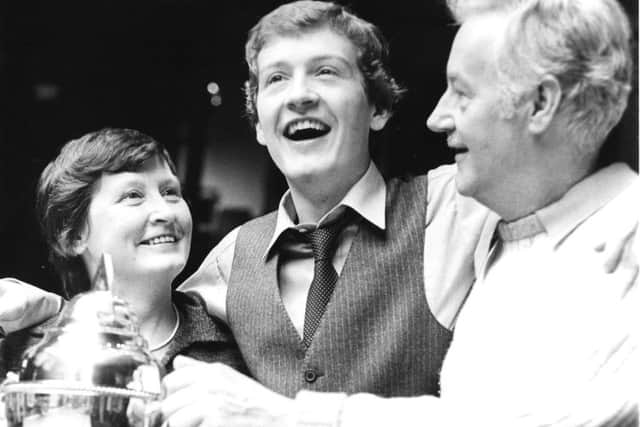Interview: Interesting twist on boring Steve Davis


It meant, in my town, a hall in a street called Manse Road, which surely can’t have thrilled the local minister, and another emporium in a more likely setting, opposite a bovver-boy outfitters. It meant shilpit characters as thin as snooker cues with pasty faces skulking in the doorways, at which anxious mothers on passing buses would point and caution their feckless sons: “Look – that’s what’ll become of you if you don’t stick in at school.” And it meant Peter McDougall’s Play for Today, Just a Boys’ Game:
Product of Misspent Youth No 1, after gouging out a trench in the baize: “Ach, ah needed a rest fir that shot.”
Advertisement
Hide AdAdvertisement
Hide AdProduct of Misspent Youth No 2, playing the neighbouring table: “Aye about a week in bed.”


No 1: “Who the f**k are yooz?”
No 2: “The man who shot Liberty Valance.”
This scene was the prelude to a young man wetting himself inside the hall in fear and trepidation at the gang violence soon to explode on the mean streets of Greenock. Snooker, it’s safe to say, wasn’t universally loved before the events of exactly 30 years ago. Then the “black ball final” changed everything.
It’s true that snooker had already come in from the cold, and the seedy, before the 1985 world championship showdown between Steve Davis and Taylor, but that was the final which slammed the sport into the corner pocket of the wider public consciousness. Davis had three titles by then but we thought of him as a snooker machine with the personality to match. Taylor, with his Irish brogue and funny specs, was a hugely popular winner of an incredible contest which after his comeback from 0-8 down was decided on the last ball of the last frame. Honestly, it was amazing neither of the participants wet their breeks in the unbearable tension.


The 18.5 million who watched remains BBC2’s biggest audience and the biggest for anything, post-midnight. I remember being sent by my mother to walk the dog – she couldn’t possibly miss a shot – and every living room I passed glowing green through net curtains. I tell Davis this, but know he must have heard thousands of stories like it, most of them better.
What’s his favourite? He mentions a young lad sent to bed because he had school who continued to watch on an old black-and-white set in his room. When he heard his father coming up the stairs he quickly turned it off and pretended to be asleep, unaware the old man had been going to get him up for the final frame.
“Everyone remembers what they were doing, who they watched it with,” says Davis. Nice story, but he can see I’m slightly underwhelmed. “That’s in your new book,” I say. “Okay,” says the author of Interesting, “here’s one that isn’t: it involves the friend of another snooker player who’s never been able to tell his mate what happened to him that night but for some reason wanted to unburden himself on me.
“He pulled a girl and took her back to his hotel. Dennis and me were on in the bar and this bloke got caught up in the match. The girl got impatient. ‘Let’s go upstairs’, she said. It got to the last frame. ‘Come on,’ she said, ‘I need to be at the hospital early in the morning’. Finally, after he’s negotiated for the telly in the room to stay on, sound off, they got down to business. He was having a fumble, checking the score over the girl’s shoulder no doubt, when he grabbed a handful of meat and two veg. ‘That’s why I’m going to the hospital’, she said, ‘to have it all chopped off’.”


We’re in a cafe in Sheffield close to the Crucible. The carrot-top has long gone and what hair that remains is close-cropped but Davis, 57, still looks lean enough to fit into his original dinner-suit. He still plays in the championship, but in the manner of the golfing great, greeting the early-rounds applause with a fluttery wave, before nipping upstairs to join the commentary team. It’s applause which says: “You’re part of the furniture now” and “Good on you, Steve – sorry for booing you back in the day and thinking you were boring” and “Crikey, have you just turned into the Queen Mum?”
Advertisement
Hide AdAdvertisement
Hide AdHis laugh is a Cockney titter, like that of a trilby-sporting spiv in an Ealing comedy. “The final against Dennis was the best and worst moment of my career,” he says. “The worst because of going eight-nil up and – boof! – throwing it all away on the last ball. My world fell apart, or so I thought at the time. Afterwards there were quite a few dark moments. I’d be somewhere, thinking about one of those shots I missed, and half an hour would pass without me having moved. Then my manager, Barry Hearn, who’s my best mate, told me he’d signed Dennis, so I wasn’t going to forget that final quickly. The pair of us had to play an exhibition match. I needed a few beers and when I came to the table I remember seeing two balls instead of one.
“But, with the benefit of hindsight, it was also the best moment because of what it did for the sport. The final acquired its own folklore; it’s on that pedestal of shared experience. The great British public, I think, likes when someone who’s been having it rather too good takes a beating. They’d seen me as an automaton, whipping their favourite guys, not smiling, probably coming across as arrogant. I admit: I was a bully and I loved it. But that was the way I had to be and I couldn’t stop to think about what my facial expressions were like. After I lost, people could see I was human after all.” He titters again. “Mind you, I can say all of that safe in the knowledge I went on to win three more world championships. If losing to Dennis had destroyed my career I’d probably have had a different view.”
Davis neglects to mention his grace and humour in defeat, two more factors in the masses warming to him. Another was him being lampooned in latex on Spitting Image, which he was also able to laugh off. We all have a bit of vanity, I say, and it would have been understandable if the “Interesting” catchphrase, which always followed his alter-ego saying or doing something epicly uninteresting, had stung. “No, it never did. To the nth degree, nobody could upset me, and certainly not a puppet. I was bulletproof.” That’s the mark of a true champion, I guess.
But some of us have always thought Steve Davis interesting. Or at least from the moment – a black ball final of a revelation, this – when he came out as a fan of progressive rock. This awkward, masculine, bombastic, ridiculed, glorious music was responsible for my misspent youth. Encountering the famous, you hope to locate a hinterland and beforehand you fantasise about unlikely passions, but invariably end up disappointed. Therefore to my mind – addled by day-long drum solos it may be – Davis rates as the most fascinating sportsman there’s ever been.
He isn’t just fanatical about awkward English prog like Soft Machine and Gentle Giant and loves awkward French prog most of all. Magma sing in their own made-up language, called Kobaian (as in the planet Kobaia, to where Earthlings escaped our doomed planet – come on, keep up) and he’s cheerfully lost money promoting the band’s visits to the UK.
He reminisces about old prog gigs witnessed in a smelly afghan coat. “Do you know I used to think afghan coats were made from afghan hounds? Just like I used to think pecan pies were made from those brightly-coloured tropical birds which of course were toucans.” Davis did leave Kobaia to get into soul music. “But that’s quite a narrow bandwidth. Soul songs are either guys singing about women they used to love or not having any money – they’ve done the genre to death. So I’ve gone back to my roots.” He now writes a regular column for Prog Magazine and hosts The Interesting Alternative Show on Phoenix FM which he thinks must be the most esoteric programme around. Actually, he calls it “the most f****d-up”.
Back in the day, did he ever inflict his music on his snooker chums, such as Ray “The Count” Reardon, beta-blocking beer monster Bill Werbeniuk and Cliff Thorburn, forever described in commentary as resembling a Mississippi riverboat gambler? “Well, I fully accept I’m a musical snob but some of these guys had atrocious taste. I did have a captive audience once – actually more of a trapped one. Me and Terry Griffiths were on a long flight to China and he asked if he could listen to one of my tapes. ‘Not bad,’ he said, but I know he was just being polite. Like the old saying goes: ‘Never take your girlfriend to a Magma concert – that’ll be the last you see of her’.”
Davis, these days a divorced dad-of-two, had no time for girlfriends growing up – although when he thinks about this, snooker was a convenient excuse for not having any. “If you’re ugly with no personality, why would you go to a nightclub to get knocked back? ‘No thanks,’ I’d tell mates, ‘I’m going to practise for eight hours.’ And that was how I became good.
Advertisement
Hide AdAdvertisement
Hide Ad“My adolescence wasn’t normal. From 14 and a half I spent all my time in the halls hanging about with older guys. I was massively shy but snooker helped that. When I had a cue in my hand I felt like somebody.” Then he has another flashback concerning clobber: “I always wanted a pair of big blue platform boots but shoes in those days only came in black or brown. Two shades of footwear, three TV channels – how did we cope?” This brings to mind Ted “Voice of Snooker” Lowe’s helpful observation on Pot Black: “For those of you watching in black and white, the pink ball is just behind the green.”
South London boy Davis owes it all to his father Henry, who worked on the buses, loved snooker, only ever achieved a 58 break, but inspired the lad by returning home squiffy from the working men’s club with a beer-mat autographed by Fred Davis (no relation). Interesting is a purely snooker memoir (no prog, alas) but the early chapters paint an evocative picture of the making of a champ in a smoky world of hustlers, ten-bob gamblers, much older players, an opponent with one eye taken out by an air rifle, another in calipers, the 13-year-old Jimmy White suffering from a broken leg, octogenarian referees who could barely see the far end of the table – with first prize occasionally being a thermos flask.
Davis smiles as he remembers the day he learned his dad was willing to sponsor him for a year, to see if he could make it as a pro. “When you think about it, that was a bloody odd thing for a father to do. Pals told me their parents thought he’d been incredibly irresponsible. There was no money in the game at the time and Dad had always been the sensible type. He just seemed to get carried away by the fact I was massively improving.” The old man is 88 and still concerned that his laddie keeps up with his practice – “I put in a full week for these championships, although maybe don’t mention that to the boy I beat the first round” – while his mother Jean is 82. “They’re both hanging on,” he adds as the chirpiness momentarily deserts him. So what did Mum think of the wacky plan? “There’s a great John Bishop gag. It’s the morning after Steve Irwin has been killed [the famed crocodile hunter surprisingly being done down by a stingray]. All these crocs are having breaking breakfast, reading about it in the papers, and going: ‘You f****n’ what?’ I’ve always thought that must have been her reaction!”
Davis would almost certainly have improved on six titles if Stephen Hendry hadn’t come along. “I hated him,” he says of his Scottish usurper, although the sight of Davis losing some more only endeared him to snooker’s sofa spuds some more. “Of course it wasn’t him I hated but what he was: some other guy, coming along, taking over.
“I couldn’t believe it; I refused to accept it. If I was going to be knocked out of the world championships then as far as I was concerned BBC2 didn’t exist anymore because I didn’t want to see him win yet again. I was all for getting my old telly out of the loft and trying to watch that, thinking it might be me, even though I never won in black-and-white.
“I didn’t cope with Stephen at all well. I beat myself up, took my game apart, tried whisky before games, tried no sex before games – I disappeared up my own backside. I felt like Peter Sellers’ character in Dr Strangelove: my left hand was absent-mindedly still filling in entry forms for tournaments while my right was going: ‘What the f**k are you doing?’ But it’s the curse of the sportsperson. The circle of life means that one day you’ll no longer be able to cut it.”
That titter again. “I didn’t start talking to Stephen until he started losing.” The pair play poker together and now and again will pick up their cues for exhibitions featuring formerly omnipotent and now slightly wheezy snooker robots. “To be honest, I think I coped better with Stephen than he did with Ronnie O’Sullivan. The other day he was beating himself up over not making a 147. And he still practises hard – what’s that about? I tell you, the guy needs a hobby!”
Something like prog. The older Davis gets the more out-there his musical tastes. “I don’t understand why so many people just accept the pap they’re fed.” I ask for names of current raves and he’s impressed that I know about, and like, Prefuse 73 who comes under the heading of glitch-hop. He mentions Frank Zappa and I nod nervously – with good reason because Davis only likes his classic works, those written for the clavichord, including one which soundtracked a never-seen Jacques Cousteau film. He mentions Oneohtrix Point Never (yikes) and Surgeon (Sturgeon?) and suddenly I’m in a Cousteau film, drowning fast.
I thought I knew my music but Steve Davis has got me snookered.
• Interesting (Ebury Press, £20).